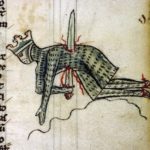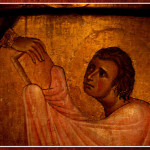We run our website the way we wished the whole internet worked: we provide high quality original content with no ads. We are funded solely by your direct support. Please consider supporting this project.

Jesus’ Different Kind of Nation
God called Abraham to form a unique nation by which “all peoples of the earth will be blessed.” The unique call of the descendants of Abraham was to become a nation of servant-priests whom God would use to reunite the nations of the world under his loving Lordship.
The vision of a reunited humanity is hammered home with increasing clarity and strength throughout the OT. Jeremiah looks forward to the time when “all nations will gather in Jerusalem to honor the name of the Lord.” Zechariah prophesies of a time when the Lord will “be king over the whole earth” so that he will be the only Lord confessed among the nations. And Joel prophesies of a time when God’s Spirit would be poured out “on all people.”
In Isaiah 55 the Lord announces that anyone from any nation who is thirsty or hungry can come and feast at his banquet table for free. He promises everyone who comes to his feast that he will bring them into the “everlasting covenant” that he “promised to David.”
In that same chapter, the Lord makes his global goal clear when he states how his chosen people will “summon nations you know not, and nations you do not know will come running to you” because the Lord has endowed you with splendor. God’s goal was to bless Israel as a means of attracting all nations to himself.
This blessing through this different kind of nation comes as other nations are united under a divinely appointed king. In Psalm 72, we read how the author prayed for a day when “all kings” and “all nations” will bow down” to a king whom God will anoint. When this happens “all nations will be blessed through [God’s anointed king]” and “the whole earth” will “be filled with his glory.”
Through this king all the tribes and nations will be reconciled as they come to know the one true God. Through him God’s dream of a united human community reflecting his triune love will be finally realized.
When the New Testament announces that Jesus is the “Christ,” it is an announcement that he is the anointed one, as Christ means “anointed.” The NT also refers to Jesus as the Lord, not just of the Jews, but of all people. In him, all the prophecies about the nations being reunited will eventually find their fulfillment.
Most of the Jews of Jesus’ day were intensely nationalistic and were expecting a completely pro-Israel Messiah. They though the Messiah would lead Israel to victory over their Roman oppressors and would reestablish Israel as a sovereign nation under God. This is why people tried to force Jesus to act and speak to divisive political issues of the day. But he refused to weigh in on these debates.
Jesus would not let himself be co-opted by any nationalistic agenda—not even on behalf of God’s “chosen nation.” For the kingdom that Jesus came to establish is about fulfilling God’s dream of reuniting all the nations.
Jesus reveals that, where God reigns, national walls will be torn down and national distinctions rendered insignificant. “In Christ,” Paul says, “there is neither Jew nor Gentile.” In Christ “the dividing wall of hostility” has been abolished between groups of people and a “new humanity” has been created. A central aspect of this kingdom is manifesting the beauty of what it looks like for a people to be freed from defining one nation against other nations and to be reunited under the God who is Lord of all nations. Jesus is a different kind of king establishing a different kind of nation.
—Adapted from The Myth of a Christian Religion, pages 78-81
Image by Marcia Erickson
Category: General
Tags: Blessing, Israel, Jesus, Kingdom of God, Nationalism, New Humanity
Topics: Ethical, Cultural and Political Issues
Related Reading

How can you believe Matthew’s report about the Jewish cover up of the resurrection?
Question: In Matthew it’s reported that Jewish authorities tried to cover up the resurrection of Jesus by saying the disciples stole the body while the guards were sleeping. I don’t buy it. How would Matthew know about this story, since it was a secret conversation the authorities had with the guards? And how could they…

God’s Non-Violent Ideal in the OT
While God condescended to working within the violent-prone, fallen framework of his people in the Old Testament—as I argue in Crucifixion of the Warrior God—the OT is also full of references to how God worked to preserve his non-violent ideal as much as possible. He did this by continually reminding his people not to place…

Part 3: Disarming Flood’s Inadequate Conception of Biblical Authority
Image by Ex-InTransit via Flickr In this third part of my review of Derek Flood’s Disarming Scripture I will offer a critique of his redefined conception of biblical inspiration and authority. I will begin by having us recall from Part I that Flood holds up “faithful questioning” over “unquestioning obedience” as the kind of faith that Jesus…

The Danger of the Penal Substitution View of Atonement
About 25 years ago I was traveling on the freeway to somewhere or other and I stopped at a truck stop to get a bite to eat. I sat down at the counter next to this scruffy truck driver who had just started his lunch, and we started up a friendly conversation. Within about fifteen…

Why Did It Take SO Long for God to Reveal Himself in Jesus?
Greg talks about why it took God so long to reveal himself in Jesus. http://traffic.libsyn.com/askgregboyd/Episode_0048b.mp3

What To Do With the Violent God of the Old Testament
For eight years Greg has been researching for and writing the book entitled The Crucifixion of the Warrior God. In it he confronts the commonly held idea that the Old Testament depictions of God behaving violently should be held alongside of and equal to the God revealed through Jesus dying on the cross. But if the Old Testament…
